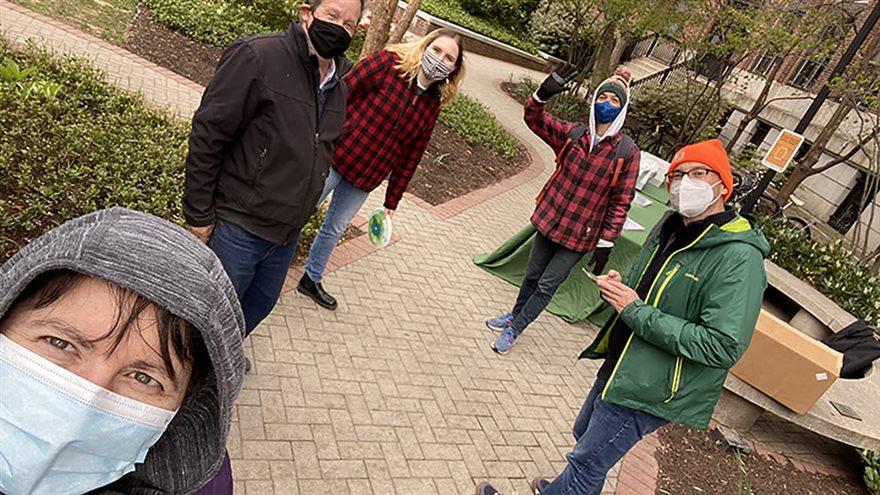Eco-Passionate Students Find Outlet, Experience Through Climate and Sustainability Working Group.
 By Beth Ann Downey
By Beth Ann Downey

When first-year environmental engineering student Avani Kavathekar arrived at Drexel University last fall, she looked for a place to get involved in climate and sustainability efforts on campus.
By winter term, she had learned about the new Climate and Sustainability Working Group that was soliciting student involvement through the Drexel Community Scholars program. Now, she’s getting hands-on experience promoting sustainability resources and projects within Drexel’s academic offerings and in the community, as well as working on setting up a new peer education program launching on campus this fall.
“I think having a team dedicated to climate sustainability is really important,” Kavathekar said of the working group, which is a cross-functional team of faculty, professional staff and students convened in spring 2020 in conjunction with the University’s “Climate Year” initiative also adopted by the Academy of Natural Sciences.
Student involvement in the working group has not only been robust since it was formed over a year ago — it was student advocacy that helped lead to its formation in the first place. In his speech at the College of Arts and Sciences commencement ceremony on June 8, recent biological sciences graduate and outgoing President of the Undergraduate Student Government Association (USGA) Tim Hanlon outlined how he and other representatives from student government began meeting with University leadership with ideas of creating a centralized sustainability office at Drexel starting in his freshman year.
“I am proud to announce that Drexel has laid the foundation for our very first Office of Sustainability,” Hanlon said in the speech, mentioning leaders of the working group by name. “…The work of countless students, faculty, staff, and University partners came together to now put Drexel on the map and committed to a greener future.”
Jen Britton, director of communications and special projects for the Office of University & Community Partnerships and a member of the working group’s core team, said Hanlon and other students who have become involved with the working group have been instrumental to getting Drexel’s sustainability strategy up and running.
“We owe so much to USGA leaders like [Hanlon], and Shivani Patel [second-year finance and economics], who have consistently made the case for elevating sustainability issues at an institutional level,” Britton said. “Making sure that students are engaged in shaping the work we are doing, with Climate Year and beyond, is one of the working group’s core priorities. It’s very clear to us that students and their families expect higher ed to drive climate solutions, and that the students who are part of our team are going to be climate problem-solvers in the careers they pursue.”

Students will start seeing the work of the Climate and Sustainability Working Group, as well as more ways to get involved in sustainability efforts on campus, in action very soon if they haven’t already. Aditi Bawa, a fourth-year custom-design major studying evidence-based public policy, was the first co-op student to work with the group during the spring/summer cycle last year. One of the key initiatives she suggested and helped implement was an interdisciplinary case competition through which undergraduate student teams proposed ways for Drexel Dining to minimize single-use plastics while still maintaining necessary COVID-19 health and safety measures. The "Climate, COVID-19, & Drexel Dining" case competition took place on Jan. 27 and boasted 25 student participants.
“It was really awesome. It was very startup-y culture,” Bawa said of the co-op experience. “We just took ideas and ran with them. Even though I was a student, they really listened to what I had to say.”
Due to the success of the first event, there is a second climate case competition taking place through July 15 focusing on ways to communicate the public health impacts of climate change. Additional initiatives with student involvement at the helm include the Climate Year Speaker Series and the new list of Drexel courses with climate and/or sustainability content.
Grace Zaborski, a third-year environmental studies and sustainability major who is also the second and current co-op student for the working group, has had a hand in several of these projects. She has also been working with the Drexel Community Scholars to shape the Eco Reps program planned for kick off this fall. The goal is to have student ambassadors advocating for sustainability to their peers through such avenues as engaging new students during Welcome Week, hosting events, speaking to CIVC 101 classes, and having a presence in residence halls.
“[This program] will hopefully encourage greater sustainability among the student base on campus and allow students to feel like their voices are being heard, and also just share with their friends why they care about sustainability and why we all should care about it,” Zaborski said, adding that the reps would also aim to engage and work with sustainability-focused student organizations like Fossil Free Drexel, Drexel Sierra Club and Weekend Warriors.
Vaidehi Andhare, a second-year custom design major studying socially sustainable technology who started working with the group as a Drexel Community Scholar last fall, created the climate and sustainability-focused class list and said it is a resource she wished she had back when she was formulating her major.
“I spent so many hours looking through the portal to see like what classes are offered and during what terms,” she said. “If this was something that was there [before], it would have made life so much easier.”
Now, Andhare is working on a special research project alongside Britton to better understand the experience of students of color who are interested in pursuing environmentally focused careers in predominantly white industries. She is enjoying how this and other projects through the working group hand down a lot of responsibility to students and provide opportunities that might not be available otherwise.
“This is something that I'm interested in, so being able to do research for it is wonderful,” she said. “I want to really understand how it affects people in general and not only communities, but also communities of color specifically with environmental racism and injustice. So I think it's just been really helpful because these are not things that are usually talked about in classes.”
Zaborski has also enjoyed how her co-op with the Climate and Sustainability Working Group has enabled her to give back.
“Learning all about Drexel’s sustainability initiatives, it's really interesting,” she said. “I really like that I get to have a role where I'm giving back to a community. A lot of the things that I've looked for in a job that are fulfilling are giving back to a community that I'm from.”
Zaborksi has also been working on analyzing Drexel’s data related to the Sustainability Tracking, Assessment & Rating System (STARS) utilized by the Association for the Advancement of Sustainability in Higher Education (AASHE) in order to formulate steps for the University to not only continue to improve its score, but to lessen its climate impact overall moving into the future.
“The impacts of climate change are definitely already starting to be seen and will only be seen in greater capacity in the future,” she said. “But I think that everyone should be aware of the fact that this is our community and we have to make a difference in our community to make a difference in our greater world.”
Bawa said it’s both a responsibility and a privilege for students to continue to be involved with the University’s climate and sustainability efforts through the working group and other initiatives.
“Drexel listens to students,” she said. “It's really important for the Drexel community to listen to us and for us to be more collaborative members. We're not just students. We're part of this community.”
To find out how you can get involved with Drexel’s climate and sustainability initiatives, click here.